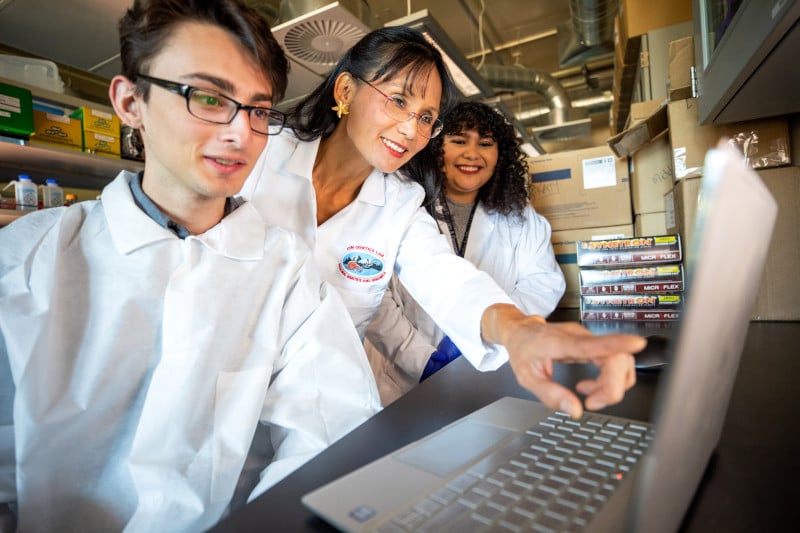At a time when the world is gripped by the COVID-19 pandemic, the need for trained student researchers in the biomedical field may have never been greater. That’s why the unique undergraduate student research training program offered by Northern Arizona University’s Pathogen and Microbiome Institute (PMI), established through the leadership of Regents’ Professor Paul Keim, is more relevant and important than ever as it prepares students for real-world challenges with hands-on experience. In the internationally recognized, cutting-edge PMI labs, students learn alongside some of the world’s leading microbiologists and genomics experts who identify superbugs through DNA sequencing and track pathogens to study deadly outbreaks.
As the associate director of the training and education core for PMI, Dawn Birdsell oversees the undergraduate research program. Currently, 40 paid student researchers work a minimum of 15 hours a week all year round. With 10 different research areas, students may study viruses, bacteria and fungi that cause deadly diseases like Zika, melioidosis and Valley Fever, work with biohazardous materials, develop software to help researchers manage complex databases or investigate connections between the microbiome in the guts of mammals and diseases like Alzheimer’s, for example.
Although the PMI lab facility includes a Biosafety Level 3 (BSL3) laboratory where highly skilled professionals work with live strains of dangerous germs, like anthrax, student researchers may gain experience in the Biosafety Level 2 lab.
“We hire students and have a structure in place that provides an opportunity for them to achieve more than they thought was possible,” Birdsell said.
Allen Clarke, a computer science and mathematics double major, is using his programming skills to create tools to help PMI researchers manage their gene sequencing work.
“I’m thankful I can look back at the work I completed at PMI and say I contributed to something meaningful.”
Birdsell treats her new hires and their training programs with the utmost professionalism. Included is a mandatory professional development workshop conducted every two weeks. She invites guest speakers such as practicing physicians or research scientists to talk about their professions.
“I always ask them to come with nuggets of wisdom to pass along to students,” she said.
One such speaker was a medical doctor who works at the Centers for Disease Control and Prevention in Fort Collins, Colorado. The doctor is part of the epidemiology team in charge of tracking the Zika virus and has traveled extensively to South America, where the mosquito-transmitted epidemic emerged.
“She gave her top 10 things you can do, even if you have zero talent, including, ‘Have a strong work ethic and have some enthusiasm. If it doesn’t interest you, either leave or figure out how to make it interesting,’” Birdsell said.
Birdsell also conducts panel discussions on business skills like resume development, interviewing tips and grant writing. She continually assesses the students’ professional development needs through surveys and informal conversations.
“It’s just amazing to see how much effort Dr. Birdsell puts in to support us as undergrads and ensure that we’re succeeding,” said microbiology major Kaitlyn Parra.
But getting into the program takes persistence, Birdsell admits. They conduct interviews and perform reference checks because they want students to stick around once hired.
As a result, the work that goes into finding serious applicants appears to pay off. The PMI undergraduate research program has a 90% retention rate, which Birdsell says is a reflection of the positive relationships that are fostered through clear communication, structured training, proficiency tests, evaluations, feedback and opportunities to improve.
She attributes the program’s success to PMI’s high standards and Keim’s leadership. “He lays out a vision, gets buy-in and provides space for creativity and opportunities.”
Meanwhile, Birdsell is personally driven to ensure data integrity. “You can only get good data if you have a literate population, and a literate population is one that knows how to think critically.”
Birdsell came to PMI in 2006, after working in labs at other universities. She says she’s never seen a program like this one. “Our students are more than ready to take on a master’s program after this. It’s a rigorous training program, but we tell them, ‘If you can keep the commitment and do the work, then you will be a different person professionally.’”
She calls the program transformative. “They come in as students and leave as teachers. It’s a community within a science ecosystem. Not only do the students experience peer support for lab challenges, but that support crosses over into their academics. They are always coaching each other and helping one another.”
Student researcher Chris Keefe is earning a double-major in computer science and biology while developing computer software for PMI. “Finding a place where I can work on biological questions and try to understand more about the world through code is kind of a perfect synthesis of my interests,” Keefe said.
Students to participate as PMI researchers develop new methods to detect and treat COVID-19
NAU announced on April 3 that PMI will look for ways to mitigate COVID-19’s impact on society by researching ways to develop detection and treatment methods.
“Undergraduate students are the next generation workforce, and the PMI undergraduate research program is designed to instill timeless professional skills that will enable students to successfully manage future challenges head on,” Birdsell said. “The sudden descent of the COVID-19 pandemic solidifies the relevance of research and the importance of training our next generation workforce to meet novel challenges faced today and tomorrow.”
Some aspects of this research and laboratory logistical support will be conducted by PMI students, Birdsell noted, which will give them first-hand experience on mitigating this pandemic.
“Professional and personal transformation of students are forged from such research opportunities like this within a rigorous training environment. Transformation of students is the ongoing contribution of the undergraduate training program at PMI and will be its positive legacy.”
Bonnie Stevens and Kerry Bennett | Office of the Vice President for Research




